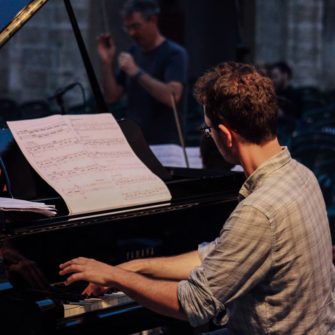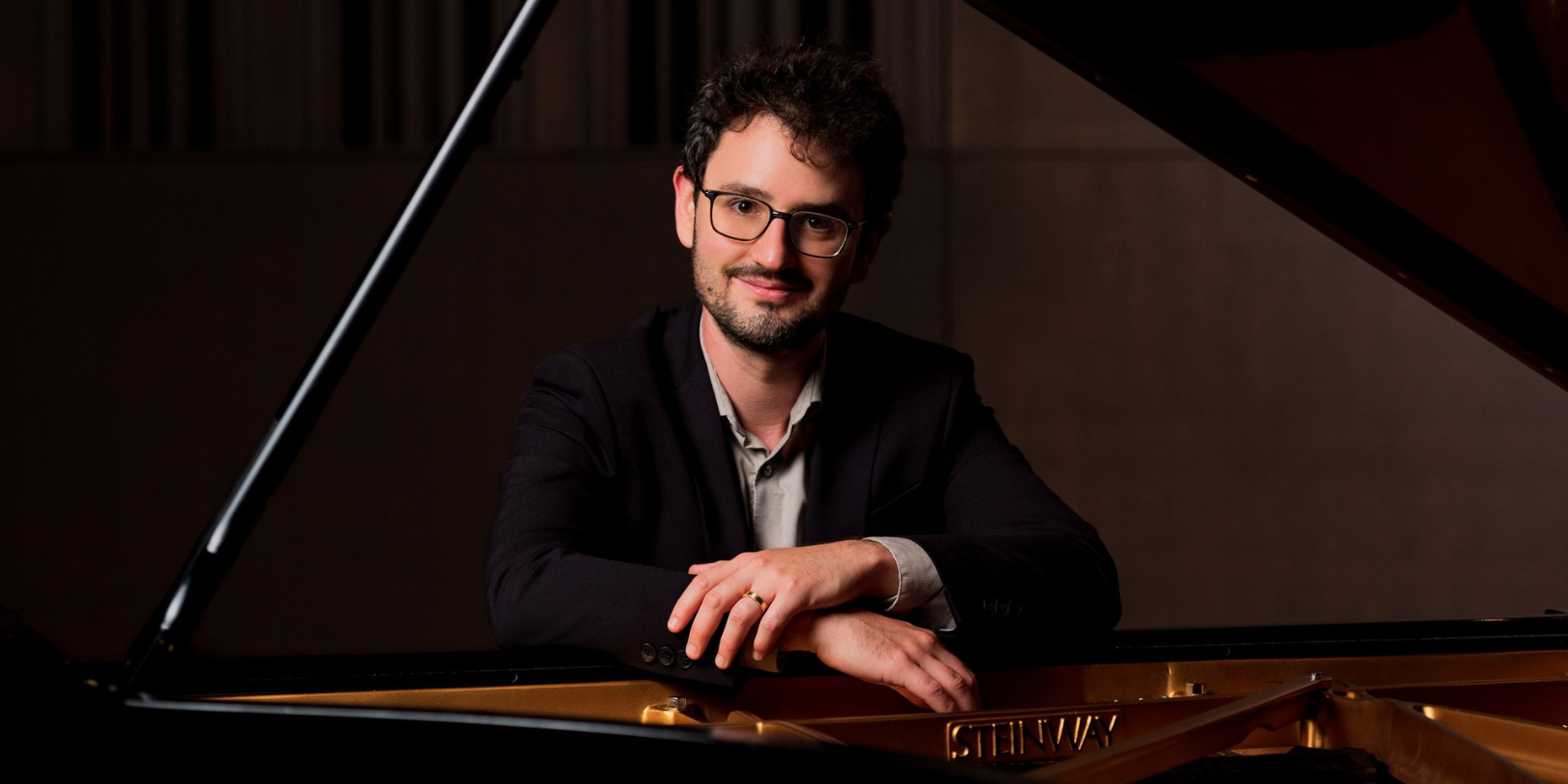Eastman’s spring semester of 2024 concerts begin on Thursday, January 18, with a recital of recent music by Daniel Pesca ’05E, ’16E (DMA), an assistant professor in the Composition Department. A renowned pianist and composer and a leading figure in the American contemporary music scene, Daniel received two degrees from Eastman and a master’s degree from the University of Michigan, has taught at Ithaca College, Syracuse University, Northeastern Illinois University, and the University of Chicago, and returned to Eastman as a newly appointed composition professor in fall 2023.
Daniel’s January 18 recital offers a showcase of some of his recent music. In a recent interview, he explained that this recital will also reunite him with several performers who have been important and inspirational to his music-making.
Can you briefly describe each of the pieces on this program and why you chose them?
To open the program, I will perform my most recent solo piano piece, a ten-minute Chaconne from 2023. This is a time-honored form (consisting of a series of variations over a repeated bass line), and my work includes nods to many historic composers, from Bach to Gubaidulina.
The next piece, In Solitude, is a solo cello work written during the early days of the COVID lockdowns. The first half concludes with a substantial duo for flute and piano, Gestures of Grace, inspired by the elegance and fluidity of dance.
After intermission, Dieter Hennings ’05E (MM), ’15E (DMA) will perform a set of three intermezzos for solo guitar that I composed for him. The program concludes with Walk with me, my joy, an extended quartet for flute, cello, percussion, and piano that unfolds as a spacious series of reflections on a folksong my mother sung to me as a child, “Shule Agra.”
Walk with me, my joy was the determining factor in the program’s overall structure. The three incredible musicians who are joining me onstage for that piece are flutist Sarah Frisof ’04E, cellist Christine Lamprea, and percussionist Ian Rosenbaum. We are the team that premiered the piece in 2022, and it will be a profound pleasure to reunite for this performance.
I chose works from my recent catalogue that could further feature Sarah and Christine, and Dieter happens to be at Eastman guest teaching this semester. I ordered the pieces for a good ebb and flow of energy.
Your biography references your “passion for collaboration.” How has that influenced your compositions?
Collaboration is at the heart of my musical life! It is what feeds me creatively as a composer, and what inspires me as a pianist as well. I am artistically the happiest when I am in community with other musicians, which is one of biggest reasons I am so pleased to be on faculty at Eastman.

Daniel Pesca at the piano
This manifests in a wide variety of ways in my music. For instance, Gestures of Grace was composed for Sarah Frisof, an Eastman alum with whom I have had a duo partnership since 2007. I wrote the piece in 2021, by which point we had played much of the standard flute and piano repertoire. So when I came to write this piece, I knew her sound and her artistry inside out, and everything about the way the piece breathes and moves is connected to her playing.
In the case of my intermezzos for guitar, Dieter Hennings — also an Eastman alum — was incredibly generous and responsive during the process of composition, providing feedback on many questions of idiomatic writing. As I was writing, he made these fabulous little one- or two-minute tutorial videos, just for me. Thanks in large part to his patience and amazing musicianship, the piece sounds gorgeous under his fingers.
In Walk with me, my joy, I was writing for a group of four very different instruments. In order to maximize the conversational potential between them, I break down the ensemble into its constituent duos and trios through much of the center of the piece, and each instrument has its moment to be featured. Thus, the form of the piece itself mirrors a collaborative working process.
You are very active as a composer, performer, and teacher. How do each of these areas affect the other? How do you balance all of them? Do you ever want to concentrate on just one area?
My life would be less hectic if I didn’t do quite so much, that’s for sure! And perhaps my career would have progressed more linearly if I had been more focused. On the other hand, I would absolutely not want it any other way. These areas of practice—composing, performing, teaching—all nourish one another, and my work in each area is made more distinctive by my range of activities as a whole.
That said, there is a rhythm to my career: certain strands surge and overtake the others from time to time. For instance, composition requires intensely concerted effort to make progress, so I have found that it can quite easily fall by the wayside when the academic year gets busy, or when I have a lot of upcoming engagements as a pianist. But I have learned to trust that it is still there waiting for me when I am able to get back to it.
Since as a pianist you have such a large performing repertory, do you find echoes of other composers’ music in your own?
Musical practice is a conversation! Knowingly or not, we are always in dialogue with other creators: past, present, and future. I feel fortunate to have gotten hands-on experience with such a large swath of repertoire through my work as a pianist. These myriad influences and echoes enhance my music. To some degree, the art of composition is about harnessing these echoes, these inherited styles and idioms, and fashioning — “composing”— them into new shapes.
I love the way different listeners are attuned to this in divergent ways. Listeners have a vast array of associations with my music—many of which I find surprising and edifying!
Having studied at Eastman, what was it like returning as a faculty member? What are some of the most important things you learned here— and what are the principles you want to instill in your own students?
I learned the joy of musical collaboration at Eastman. Being a composer in a conservatory environment with so many outstanding performing peers spoiled me, frankly! And there is a tremendous culture of new music performance, thanks to faculty members who foster a spirit of exploration and to a uniquely inquisitive student body.
My wish for my students here is that they fully immerse themselves in this environment: they should go to concerts of all sorts, meet as many musicians as they can, and passionately engage with all their coursework. Composers should be voracious! The more we consume, and the more varied and diverse it is, the richer and more multifaceted our art is.
As a faculty member, I often think about how Eastman is both the same and different from what it was in my student years. Some faculty from my student years are still here; many are not. Many aspects of the curriculum are the same; some have shifted. It’s exciting to have a voice in the conversations about how the institution moves ahead in a rapidly changing music world—how to preserve the best of what Eastman has been, while innovating in new directions.
If I am a music lover who does not know a lot of contemporary musical styles or techniques, how would you introduce your music to me?
Many of my ideas for my pieces come from outside music. Sensations from the other arts, or from life, might excite my imagination in a particular way that I then transform into music. When this is the case, I share this information in my program notes, in the hope that such associations might further animate my work for listeners. For instance, you can experience the dance—inspired Gestures of Grace as a pas de deux for flute and piano, which is how I first pictured it. Or you can think of it as a Classical sonata, which it also is. Or you can hear it as an intricate weave of counterpoint, passed fluidly from flute to piano and back.
Listening is not about discerning a fixed meaning; it is about being present—emotionally, physically, mentally, spiritually—for an experience. I do my best to project my inner world into my work. My highest satisfaction is to witness my music resonating with different minds, consciousnesses, and sensibilities. If you listen with attention, an open heart, and an open mind, then you are giving me a very great gift.
The Composition Department presents Music of Daniel Pesca on Thursday, January 18 at 7:30 p.m. in Hatch Recital Hall. Admission is free and open to the public.
